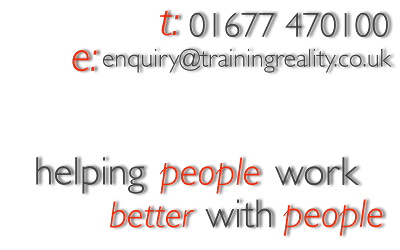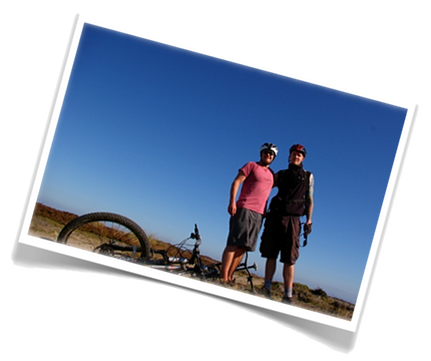


Please press (at least!) one of these.
It costs you nothing, and (possibly) helps us spread the word!
The power of failure
Sunday, 27 September 2009
Failure is one of those words that many trainers strive to avoid, sometimes replacing it with the management-speak jargon of “learning experience” or similar. As someone who values simple, clear, and basic language, I work hard to use common words rather than jargon, but to also remove the negative “attached meaning”. These negative attached meanings are what often drives the perfectly reasonable intent behind replacing perfectly good words with long-winded, bland and - if over-used - rather annoying phrases.
I failed yesterday. I headed out mountain biking with my brother-in-law, and he powered up the hills, raced down them, and was still able to walk at the end. On all but the easiest sections, I was behind him, and, on some of the uphill sections, I had to get off my bike and push. My failure was in my lack of ability (both technical, physical, and psychological) to keep up with him.
If I use the word failure to describe this, there can be a temptation to attach (negative)meaning to the word itself, and to attach (negative) meaning to the practical facts of the experience. That could then easily lead to feeling bad about myself, comparing myself unfavorably with someone else, and a whole host of other, unhelpful mental activities.
But how about if I view the failure as a positive thing? What if I re-frame the whole trip in such a way that doesn’t deny or ignore reality, but uses that reality in a really helpful way? Here goes:
1) I completed a long, tough, quick bike trip after a tough week, a number of late nights, and deliberately and bravely challenged myself to keep up with someone younger, fitter, and more experienced than me. I could have picked an easier partner, but I feel better about my abilities having tested myself to the limits.
2) I have gained in technical experience and knowledge. My seat is going to be adjusted, my body weight will be moved differently when I’m riding, and my handlebars are going to be raised.
3) My psychological approach has improved, in two very different ways. In the first, I know that I am capable of feeling comfortable (mentally, if not physically!) going downhill over rocky ground at pace, and that slowing down actually makes it more wobbly; and I know that, even if I have to grunt and grit my teeth and shout out, I can push myself up some steep and tricky routes. In the second, I also know that I don’t care whether I’m being judged by others if I have to get off and walk - that doesn’t say anything about me as a person, or my potential, apart from the amount of scope to get better that I have.
--
On the management training courses we run, I go out of my way to be enthusiastic about failure, and to encourage others to do the same. By taking people out of their offices and their day-to-day lives, and challenging them to do different things, we create an environment where failure is a good thing, because of what we can take from it. We only know if we’re stretching ourselves if we get things wrong on the route to getting them right - otherwise surely we have missed an opportunity to get there faster and better.
I don’t like it when I get things wrong; I don’t like failing; and I don’t like not being able to do things. But “wrong”, “failure”, “incapability” are only descriptions of what exists right now, of what has happened. They are not descriptions of what will happen or what is inevitable. It’s up to us to take what we have learnt and use it to get better and better at those things that are important to us.
Equally, I challenge you, and me, not to be afraid of normal, everyday words. Most people I’ve ever met have failed at something at sometime, and that’s what makes them, and me, into the interesting, real, and valuable people we are.
Time to end on my favourite quote on this subject, from Thomas Eddison:
“I have not failed. I've just found 10,000 ways that won't work.”
Please press (at least!) one of these.
It costs you nothing, and (possibly) helps us spread the word!
It costs you nothing, and (possibly) helps us spread the word!
